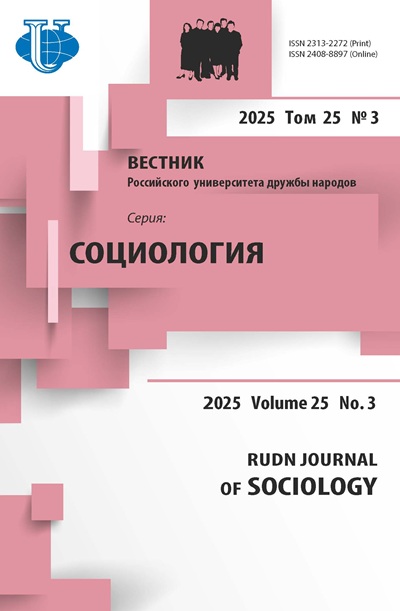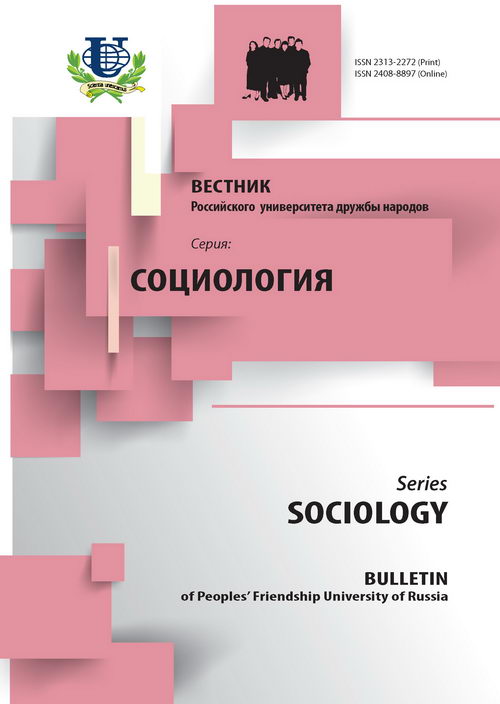Динамика самоидентификации работающей молодежи в трансформирующемся социуме
- Авторы: Химич В.Ю.1
-
Учреждения:
- Институт социологии Российской академии наук
- Выпуск: № 1 (2015)
- Страницы: 104-115
- Раздел: Статьи
- URL: https://journals.rudn.ru/sociology/article/view/6107
- ID: 6107
Цитировать
Полный текст
Аннотация
В статье рассматривается динамика изменения показателей самоидентификации работающей молодежи (экономической, правовой, уверенности в завтрашнем дне и удовлетворенности жизнью) на эмпирическом материале «Российского мониторинга экономического положения и здоровья населения НИУ-ВШЭ» с 1994 по 2012 гг. - исследований на базе анализа 19 501 представителя работающей молодежи в возрасте 16-30 лет. Анализ данных показал, что современная российская работающая молодежь очень динамично изменяет свою самоидентификацию, так как она является наиболее активной интегрированной в общество группой. Любая негативная трансформация социума приводит к негативным показателям самоидентификации работающей молодежи. Любое колебание в экономической и политической жизни страны легко дестабилизирует состояние молодежи, что в свою очередь грозит обернуться дестабилизацией общества. Так, в первые годы трансформации российского социума (1994-1996) самоидентификация более половины работающей молодежи находилась в кризисном состоянии, когда более половины работающей молодежи отмечали низкие показатели самоидентификации (бедность, бесправие, неуверенность в завтрашнем дне, неудовлетворенность жизнью) и при дефолте 1998 г. - в остром негативе. В 1999-2002 гг. оценки большей части молодежи сместились от негативных показателей к среднему состоянию, а после 2002 г. наступил и продолжается до настоящего времени этап «стабильности», когда доля с низкими показателями упала до трети, а высокая доля среди работающей молодежи стала отмечать стабильно высокие показатели самоидентификации.
Об авторах
Виктория Юрьевна Химич
Институт социологии Российской академии наук
Email: vikhimich@yahoo.com
Список литературы
- Бауман 3. Индивидуализированное общество. М.: Логос, 2005.
- Бек У. Общество риска. На пути к другому модерну. М.: Прогресс-Традиция, 2000.
- Демографический прогноз до 2030 г. Федеральная служба государственной статистики. URL: http://www.gks.ru/wps/wcm/connect/rosstat_main/rosstat/ru/statistics/population/ demography.
- Ильинский И.М. О молодежной политике российского политического центризма. М.: Институт молодежи, 1999.
- Неравенство и бедность. Федеральная служба государственной статистики. URL: http://www.gks.ru/wps/wcm/connect/rosstat_main/rosstat/ru/statistics/population/poverty.
- Тихонова Н.Е. Динамика нормативно-ценностных систем россиян и перспективы модернизационного проекта // Вестник ИС РАН. 2011. № 3.
- Уровень жизни. Федеральная служба государственной статистики. URL: http://www.gks.ru/ wps/wcm/connect/rosstat_main/rosstat/ru/statistics/population/level/#I.
- Экономическая активность населения-2013. Структура экономически активного населения по возрастным группам. Федеральная служба государственной статистики. URL: http://www.gks.ru/bgd/regl/b12_61/Main.htm.
- Ядов В.А. Социальная идентификация в кризисном обществе // Социологический журнал. 1994. № 1.
Дополнительные файлы












